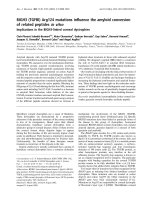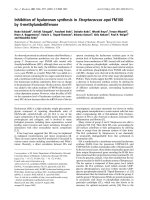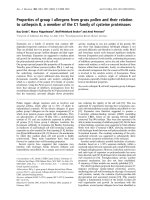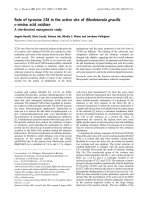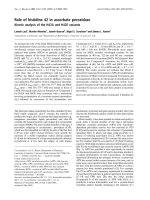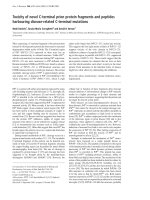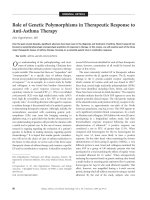Báo cáo y học: " End of life care in Brazil: the long and winding road" pps
Bạn đang xem bản rút gọn của tài liệu. Xem và tải ngay bản đầy đủ của tài liệu tại đây (118.57 KB, 2 trang )
In a recent issue of Critical Care, Fumis and Deheinzelin
[1] evaluated the attitudes regarding end-of-life (EOL)
decisions of physicians, nurses and family members in 13
Brazilian ICUs. Participants were asked whether mecha-
nical ventilation should be withdrawn from two hypo-
thetical terminally ill patients (one incompetent and
another competent) and who should be involved in the
decision-making process. e authors demonstrated that
three-quarters of all groups of respondents agreed that
withdrawal from mechanical ventilation should be
considered for the competent patient. On the other hand,
when faced with the clinical scenario of the incompetent
patient, physicians were less likely to propose such a
decision, in disagreement with nurses and family
preferences. Additionally, most respondents shared the
opinion that physicians, nurses, family members and
patients themselves should necessarily be involved in the
decision to withdraw life-sustaining therapies regardless
of the scenario.
e results of the above mentioned study have potential
implications, as disagreements between the perceptions
of nurses and physicians regarding EOL decisions are
common [2], and many ICU patients lack the capacity to
participate in discussions and make decisions about their
diagnosis, proposed treatments, and prognosis. When a
patient is unable to make decisions, family members are
automatically turned to as surrogates to decide and
consent for advanced therapeutic interventions and for
EOL decisions. However, family members are frequently
unaware of patients’ wishes and preferences in the case of
critical illness. Gaps in communication, disregarding
families’ and patients’ preferences, and disagreements in
expectancies at the EOL are well-known sources of
confl icts with devastating consequences for healthcare
workers, patients and family members, such as burnout,
depression, anxiety and post-traumatic stress disorders
[3-6]. In addition, confl icts at the EOL are perceived as
much more dangerous and severe in comparison to other
confl icts [5]. Over the past years, we have learned that
besides respectful, solidary and compassionate care of
dying patients and their families, integration of palliative
care and improvements in communication are key
strategies to achieve and provide high-quality care at the
EOL [5,7,8].
Although the debate surrounding EOL-related issues
have progressed over the past decade, in Brazil the lack of
legal regulation and consequently the concerns of
prosecution still pose severe dilemmas and compromise
the off ering of appropriate care and management to
dying patients. As acknowledged by the authors, caution
is needed when interpreting the study results, as reported
attitudes when faced with the two hypothetical scenarios
may not refl ect potential attitudes when managing
patients in ‘real life’ in Brazilian ICUs. Firstly, reported
rates of EOL decisions in Brazilian ICUs (up to 36% of
dying patients) are much lower than those reported in
Europe and the United States [9]. Second, do-not-
resuscitate orders and withholding of organ support are
more frequent than withdrawal. In addition, mechanical
ventilation is very seldom removed [10]. ird, a
paternalistic culture still prevails in Brazil (as in most
Latin-American countries) and doctors are expected to
choose ‘the best option of care/treatment’ for the patient.
Abstract
Disagreements between the perceptions of nurses and
physicians regarding end-of-life (EOL) decisions are
frequent. In a survey carried out in 13 Brazilian ICUs,
Fumis and Deheinzelin reported that the majority of
nurses, physicians and family members are in favor
of limiting life-sustaining therapies in terminally ill
patients and that such decisions should involve the ICU
team, patients and family members. However, they also
observed signi cant di erences among the attitudes
when faced with an incompetent patient. The present
commentary evaluates the potential implications of
the study results, contextualizing with the current
scenario surrounding EOL care in Brazil.
© 2010 BioMed Central Ltd
End of life care in Brazil: the long and winding road
Márcio Soares*
1,2
See related research by Fumis and Deheinzelin, />COMMENTARY
*Correspondence:
1
D’Or Institute for Research and Education, Rua Diniz Cordeiro, 30 - 3º andar; Rio de
Janeiro - RJ; Brazil; CEP 22281-100
Full list of author information is available at the end of the article
Soares Critical Care 2011, 15:110
/>© 2011 BioMed Central Ltd
Although informed consent is increasingly being adopted
in Brazilian hospitals, advanced directives are not legally
regulated in Brazil and registering of patients’ preferences
in medical charts is not a common practice, although it is
now being more frequently performed. Finally, although
a resolution of the Federal Council of Medicine
(Resolução CFM Nº 1805/2006. DOU, November 28,
2006) as well as the revised 2010 Brazilian Code of
Medical Ethics determine that EOL decisions for
incompetent terminally ill patients should necessarily be
discussed with surrogates, family members are frequently
still not involved in such decisions [11]. However, despite
such limitations, the study of Fumis and Deheinzelin [1]
provides valuable information to understand and
improve decision-making processes at the EOL and to
support the reformulation of competencies and skills
expected to be achieved in training programs of
intensivists to ensure that, in the near future, our ability
to care for dying patients and their families will improve
signifi cantly in Brazil.
Abbreviations
EOL, end-of-life.
Competing interests
The author declares that they have no competing interests.
Acknowledgements
MS is supported in part by individual research grants from Conselho Nacional
de Desenvolvimento Cientí co e Tecnológico (CNPq).
Author details
1
D’Or Institute for Research and Education, Rua Diniz Cordeiro, 30 - 3° andar;
Rio de Janeiro - RJ; Brazil; CEP 22281-100.
2
Postgraduate Program, Instituto
Nacional de Câncer, Rio de Janeiro, Brazil.
Published: 26 January 2011
References
1. Fumis RR, Deheinzelin D: Respiratory support withdrawal in intensive care
units: families, physicians and nurses views on two hypothetical clinical
scenarios. Crit Care 2010, 14:R235.
2. Ferrand E, Lemaire F, Regnier B, Kuteifan K, Badet M, Asfar P, Jaber S, Chagnon
JL, Renault A, Robert R, Pochard F, Herve C, Brun-Buisson C, Duvaldestin P;
French RESSENTI Group: Discrepancies between perceptions by physicians
and nursing sta of intensive care unit end-of-life decisions. Am J Respir Crit
Care Med 2003, 167:1310-1315.
3. Embriaco N, Azoulay E, Barrau K, Kentish N, Pochard F, Loundou A, Papazian L:
High level of burnout in intensivists: prevalence and associated factors.
Am J Respir Crit Care Med 2007, 175:686-692.
4. Poncet MC, Toullic P, Papazian L, Kentish-Barnes N, Timsit JF, Pochard F,
Chevret S, Schlemmer B, Azoulay E: Burnout syndrome in critical care
nursing sta . Am J Respir Crit Care Med 2007, 175:698-704.
5. Lautrette A, Darmon M, Megarbane B, Joly LM, Chevret S, Adrie C, Barnoud D,
Bleichner G, Bruel C, Choukroun G, Curtis JR, Fieux F, Galliot R, Garrouste-
Orgeas M, Georges H, Goldgran-Toledano D, Jourdain M, Loubert G, Reignier
J, Saidi F, Souweine B, Vincent F, Barnes NK, Pochard F, Schlemmer B, Azoulay
E: A communication strategy and brochure for relatives of patients dying
in the ICU. N Engl J Med 2007, 356:469-478.
6. Azoulay E, Timsit JF, Sprung CL, Soares M, Rusinová K, Lafabrie A, Abizanda R,
Svantesson M, Rubulotta F, Ricou B, Benoit D, Heyland D, Joynt G, Français A,
Azeivedo-Maia P, Owczuk R, Benbenishty J, de Vita M, Valentin A, Ksomos A,
Cohen S, Kompan L, Ho K, Abroug F, Kaarlola A, Gerlach H, Kyprianou T,
Michalsen A, Chevret S, Schlemmer B; Con icus Study Investigators and for
the Ethics Section of the European Society of Intensive Care Medicine:
Prevalence and factors of intensive care unit con icts: the con icus study.
Am J Respir Crit Care Med 2009, 180:853-860.
7. Nelson JE, Bassett R, Boss RD, Brasel KJ, Campbell ML, Cortez TB, Curtis JR,
Lustbader DR, Mulkerin C, Puntillo KA, Ray DE, Weissman DE; Improve
Palliative Care in the Intensive Care Unit Project: Models for structuring a
clinical initiative to enhance palliative care in the intensive care unit:
areport from the IPAL-ICU Project (Improving Palliative Care in the ICU).
Crit Care Med 2010, 38:1765-1772.
8. Truog RD, Campbell ML, Curtis JR, Haas CE, Luce JM, Rubenfeld GD, Rushton
CH, Kaufman DC; American Academy of Critical Care Medicine:
Recommendations for end-of-life care in the intensive care unit: a
consensus statement by the American College of Critical Care Medicine.
Crit Care Med 2008, 36:953-963.
9. Soares M, Terzi RG, Piva JP: End-of-life care in Brazil. Intensive Care Med 2007,
33:1014-1017.
10. Lisboa T, Friedman G: Forgoing life support in Intensive care units of South
Brazil: the results of and ethical questionnaire. Rev Bras Ter Intens 2005,
17:15-22.
11. Kipper DJ, Piva JP, Garcia PC, Einloft PR, Bruno F, Lago P, Rocha T, Schein AE,
Fontela PS, Gava DH, Guerra L, Chemello K, Bittencourt R, Sudbrack S,
Mulinari EF, Morais JF: Evolution of the medical practices and modes of
death on pediatric intensive care units in southern Brazil. Pediatr Crit Care
Med 2005, 6:258-263.
doi:10.1186/cc9962
Cite this article as: Soares M: End of life care in Brazil: the long and winding
road.
Critical Care 2011, 15:110.
Soares Critical Care 2011, 15:110
/>Page 2 of 2

